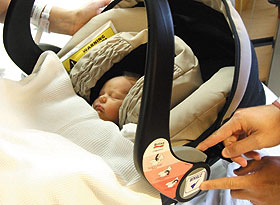  |
| HOME | THIS ISSUE | CALENDAR | GRANTS | BACK ISSUES | < BACK | NEXT > |
Health Center Auxiliary introduces child safety seat ID program by Chris DeFrancesco - September 15, 2008 | ||||
| A firefighter first to arrive at an accident scene hears a child crying. As he approaches, he finds an adult slumped against the deployed airbag at the wheel, and a baby secured in a child safety seat in the back. The child shows no signs of traumatic injury. But the driver is unresponsive. No one else is in the car. A situation like this poses special challenges for emergency responders. Who is the child? Who are his parents or guardians and how can they be reached? Does the child have special medical needs? To help facilitate the response and rescue effort, the UConn Health Center Auxiliary has introduced a child safety seat occupant identification program called WHALE, an acronym for “We Have A Little Emergency.” The WHALE program is in place in 34 other states, originating at the local level through the efforts of volunteer groups like the Auxiliary, as well as medical centers, ambulance companies, police and fire departments, sheriff’s offices, and even town governments. The kits include a label for the car seat, stickers for the car seat and car window, and an instructional brochure for parents. “We printed 2,000 kits to get us started,” says Irene Engel, Auxiliary facilitator. The label is for the child’s emergency information, including his or her name, the parents’ or guardians’ names and contact information, emergency contact information, and any medical considerations. Parents affix the label on the back of or bottom of the car seat so it’s not visible from outside the car. The stickers display only the WHALE logo and serve to alert emergency personnel that the car seat inside is labeled. “This is a simple, inexpensive way to help emergency responders at an accident scene,” says Health Center fire captain Greg Priest. “A WHALE sticker on the car tells us we can find crucial information right away.”
The Auxiliary initiated the WHALE program in Connecticut by supplying kits to the Health Center’s Family Birthing Center. Parents take WHALE kits home with their newborns. “We’ve already given WHALE kits out to more than 200 families in five dozen towns since we started the program in May,” Engel says, “and the Health Center police and fire departments have been helping with the outreach, so the public safety officials in other towns will recognize the WHALE stickers.” The Auxiliary also is in the process of coordinating with other groups across the state that are interested in making WHALE kits available in their service areas. “So far we’ve heard from people in almost every county,” Engel says. “Ultimately we’d like this to become a statewide program.” The UConn Health Center Auxiliary supports the Health Center through fund-raising and volunteer efforts. More information about the Auxiliary is available at http://auxiliary.uchc.edu. More information about the WHALE program is available atwww.whaleprogram.org. |
| ADVANCE HOME UCONN HOME |

